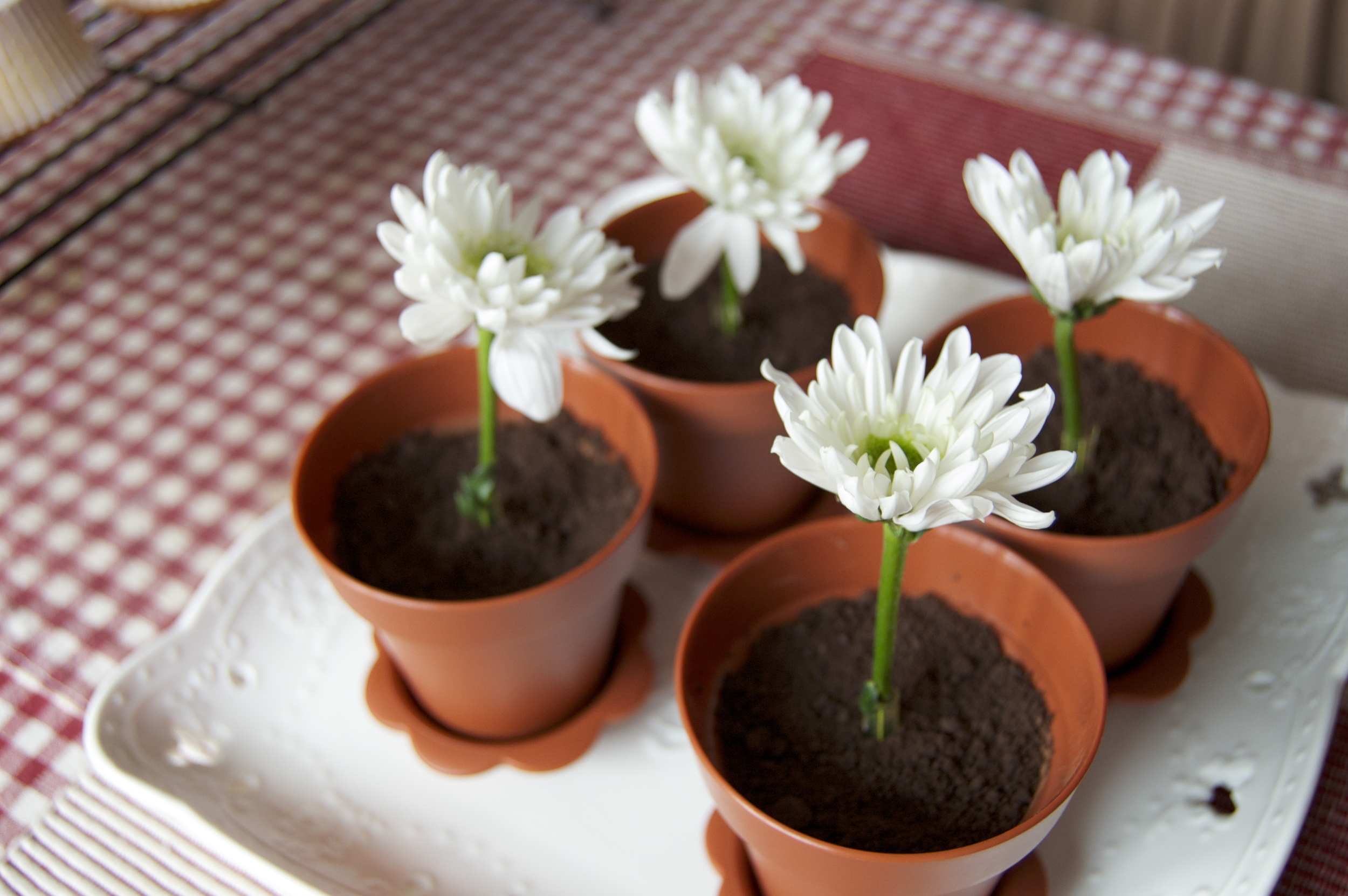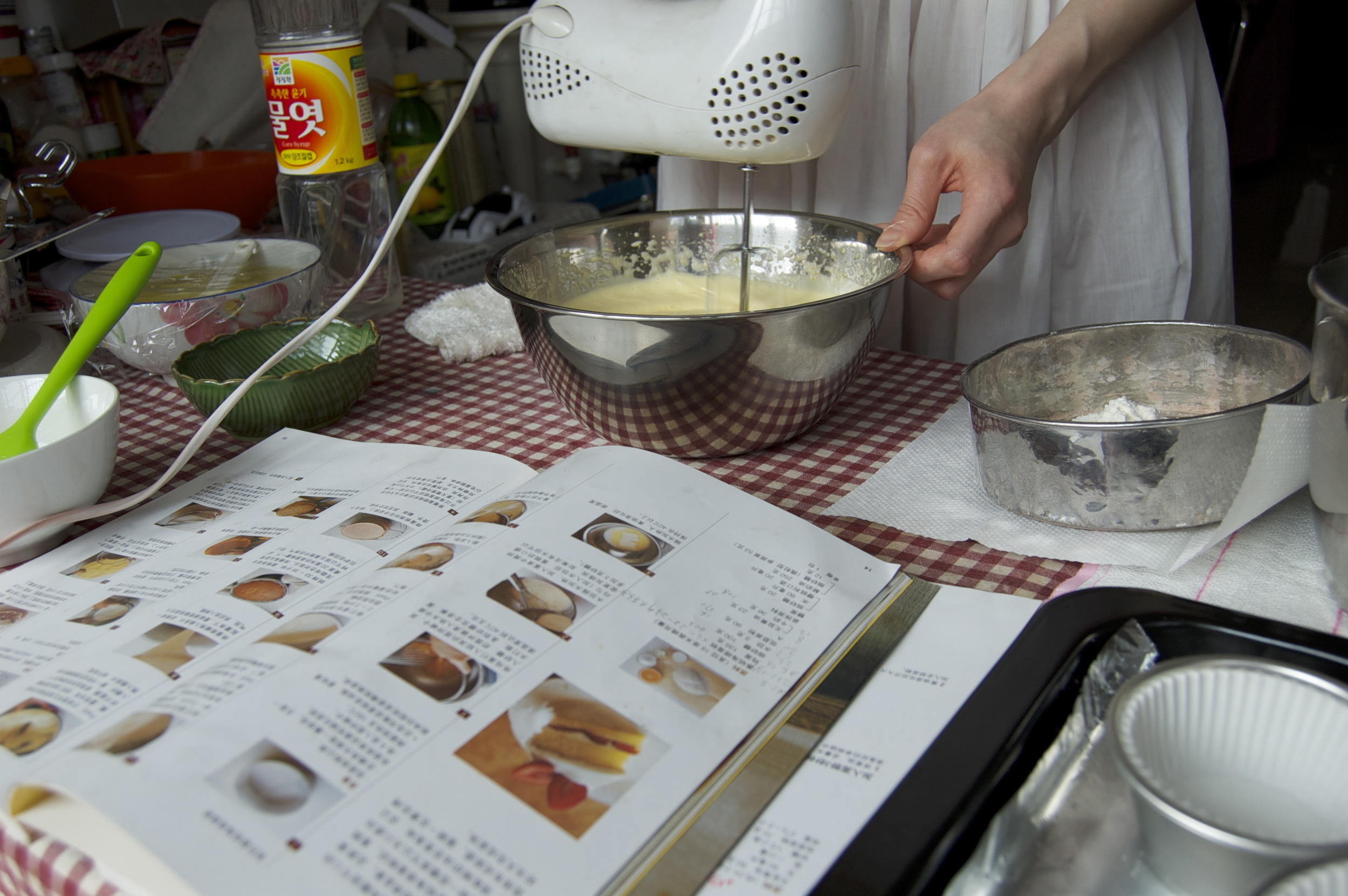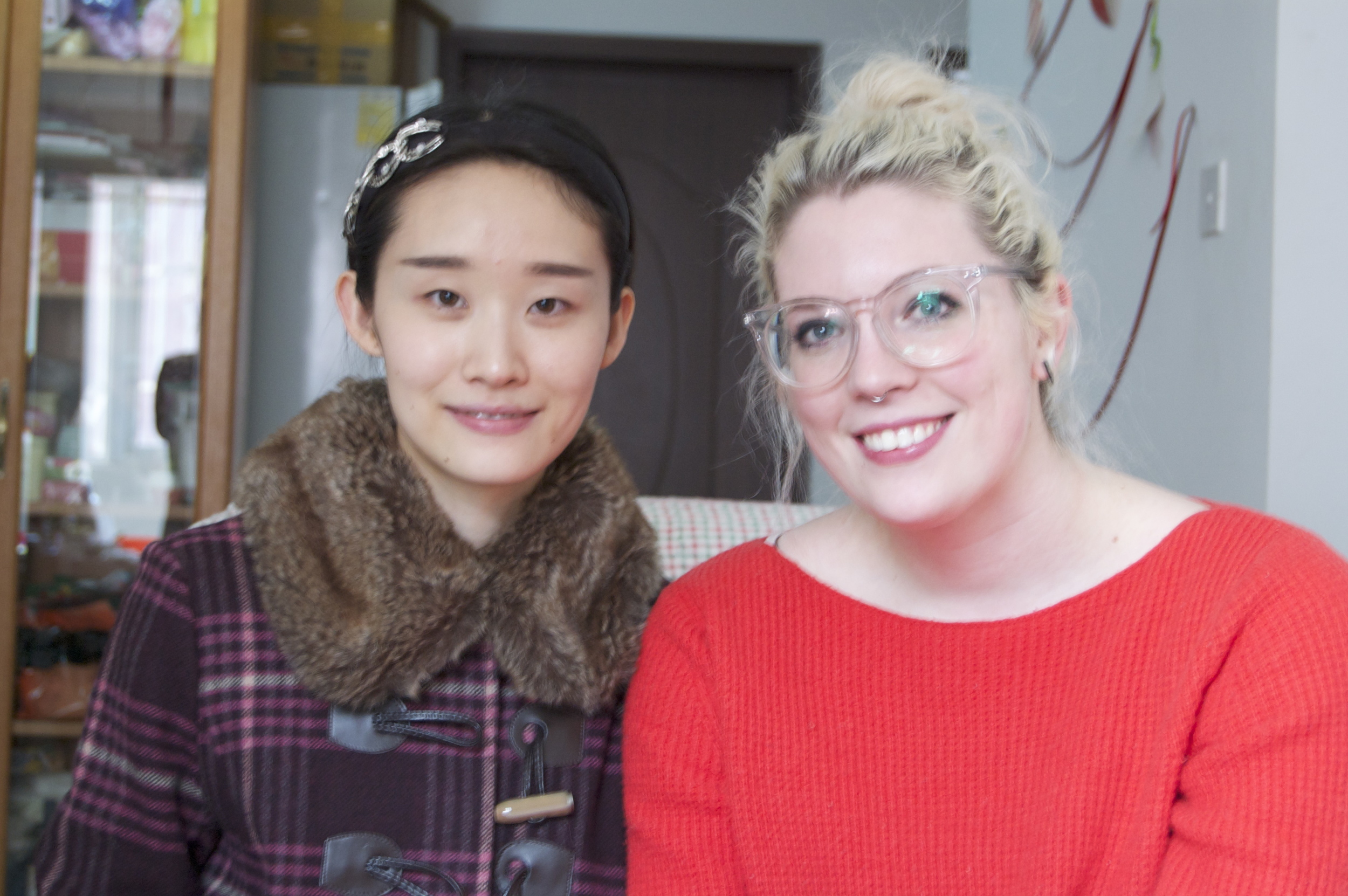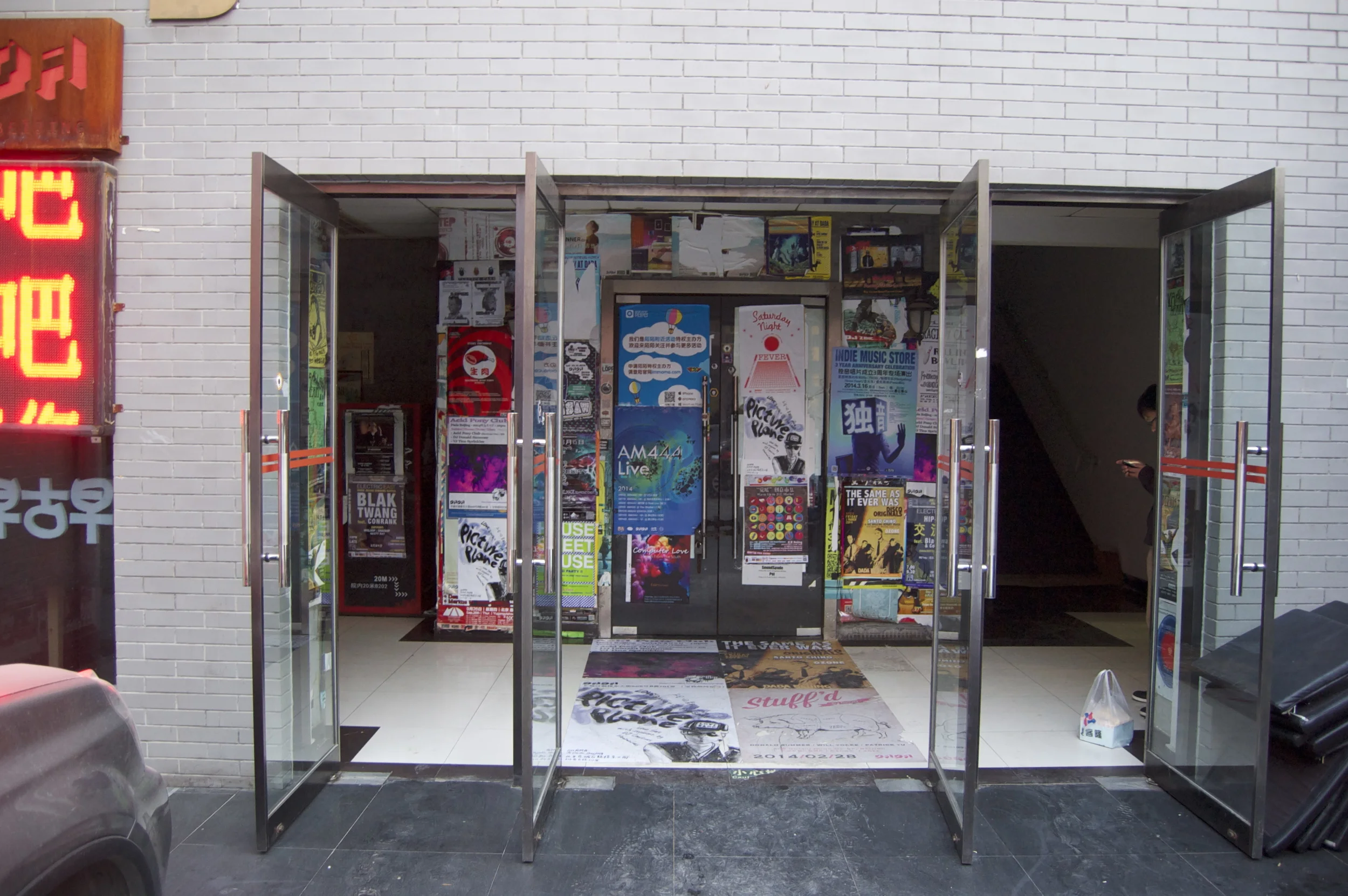Today I met up with my friend Tom Wang, a photojournalist based in Beijing, who offered to help me translate and show me around while I was in town. Our first stop was a southern suburb about an hour outside of the city to visit Hengheng, a woman who started her own online bakery. She greeted us with some of her most popular treats, all of which she baked in her small make-shift kitchen.
We sat down to do an interview and with the help of Tom (and his handy smartphone) we were able to understand each other quite easily! I asker her about her decision to leave the creative industry she had prepared for at the university, and how she became interested in Western-style baked goods. In a nutshell, she didn't want to commit to a monotonous cubicle job for the rest of her life, and instead, bought up a ton of cookbooks to learn some baking skills. Hengheng had never prepared many of the deserts that she now sells through her online shop, and perfected her technique through diligent practice and dedication. She had to be resourceful in order to find the kitchen appliances required to make the desserts, such as an electric mixer and conventional oven, since these aren't commonly found in Chinese households. Nevertheless, Hengheng successfully recreates American and French delicacies in her own home.
The decision to start an independent business is always risky, but for Hengheng it was an especially bold move. She lives in a part of the world that adheres to strict gender roles and discourages any sort of deviance from them. Hengheng's choice to carve her own path and pursue her personal passion is both brave and admirable. When I asked about her feelings towards competitors-- other Western-style online bakeries in China-- she just smiled and said that they're constant inspiration for her. It was the best response she could give because it made her a total inspiration to me!
I was overwhelmed by Hengheng's hospitality, and am so appreciative of her generosity. Even after a day full of testing her sweet creations and drinking an inestimable amount of Oolong tea, she insisted in taking Tom and me to a Uyghur restaurant for lunch. We ordered lamb kebabs to start, several Lamian noodle dishes with various vegetables, and of course, a píjiǔ to wash it all down!
After bidding farewell to Hengheng and her husband (and promising to visit them again), Tom and I took the subway to the up and coming Gulou District, a section of hutong (ancient alleyways) between the Drum Tower and Bell Tower. I read that this part of town was experiencing a cultural makeover, and wanted to do some exploring. Tom took me to Dada (pictured below), a hip club that also screens movies every now and then, but it wasn't open when we got there.
The two of us got back on the subway so I could head to my next meeting with Sharron Lovell, a freelance visual journalist living and working in Beijing. Tom, who is also interested in photojournalism and works for Sharron, prepped me for dinner by giving me a (brief) introduction to the state of media in China today. He explained the government's rationale for censoring various media outlets and how dangerous-- yet unavoidable-- it is to cover provocative issues. Because the government fears any sort of embarrassment or shame, it tries to stifle the reporters and journalists working to expose some of the country's controversial topics. As I listened to Tom, I tried to imagine the feeling of constant paranoia that many Chinese citizens experience when they attempt to learn about the things they don't hear on the government sanctioned news. I couldn't.
Our conversation took a short pause when we arrived at the Xiangcao Xiangcao Yunnan Hotpot Restaurant. After Tom formally introduced me to Sharron, we took a seat around this massive table, which had been altered to accommodate the huge pot that nested in its center. "Hot pot" refers to a type of stew preparation common in East Asia, where a broth is heated and then has different raw foods added to it (sort of like fondue). At this particular restaurant, each table contained one large pot of broth in the middle that everyone shared to cook their preferred fungus, meats, and greens. There's also always an array of sauces that you can mix to concoct your very own signature dipping sauce. I chose to play it safe with a large helping of sesame paste and chili oil, but there are scores of other options for the more adventurous sauce connoisseur.
Once we finished adding all of the enoki, smoked tofu, beef, lettuce, and other goodies to the pot, Sharron and I began discussing our respective work. She spoke about the different projects she was working on, including one that Tom was helping her with that dealt with issues effecting Chinese farmers. I talked with her about the concept of Render and shared my perspective on the intersection of feminism, food, and the representation of women in media. We also talked about the culture that exists around women and food in different societies, specifically China, but ultimately ended up on the topic of food security. Throughout our conversation, I came to realize that Render occupies a very powerful space within the context of food justice and journalism: it has the ability to place a critique on the underexposure of American female restauranteurs in magazines side-by-side with an essay on the experience of female villagers living in China that don't have access to nutritional food. Render provides a platform for this juxtaposition of privilege and resources to occur, creating an opportunity for reflection and discussion about what it means to be a feminist and a consumer.
The three of us continued to talk and share stories, stopping every now and then to feast on a meaty shiitake. Pretty soon, we all realized how full we were from the never-ending hot pot. I was enjoying it all so much and didn't want to leave, but had to rush from dinner to another meeting. Sharron and I exchanged goodbyes, and then I headed back downtown with Tom, where he dropped me off at a cafe.
Waiting for me was Peipei, a poet and musician who sometimes performs as "Little Punk." I came across her work on a Shanghai music blog, and after I contacted her, she agreed to meet with me and discuss the representation of women in China's music scene. Even though I was exhausted, Pei's energy and charisma kept me focused while we talked about her work and personal perspective on feminism. When I introduced the concept of Render to her, she responded in a way that I hadn't expected: she explained to me her inability to separate women's rights from basic human rights, which she doesn't think are being met in China. Her argument was that something as basic as the right to live should not be considered a women's issue, but a human issue. Since Chinese families must observe laws limiting the number of children a they can have, they prefer to have boys that can work instead of girls. This has resulted in the abandonment of countless baby girls, and those that survive face discrimination.
For some reason I was surprised by Pei's egalitarianism, but once she explained it to me further, I completely understood. We spent some time talking about music and other things, but it was getting late and I was falling asleep, so we ended our midnight coffee date and parted ways.
Each woman I spoke with today expanded and challenged the priorities I associate with my personal feminisms, and also fed me some amazing food. In terms of business, Hengheng inspired me to keep taking risks (they're worth it), Sharron deepened my appreciation and respect for investigatory journalism, and Peipei forced me to reconsider my perspective on gender equality.
Tomorrow I'm mastering the art of the dumpling, getting to know The Beijinger, and grabbing a drink with some folks who are taking their love of Chinese food and independent publishing to the next level.










